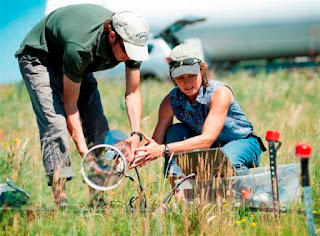Warming temperatures and rising carbon dioxide in the air are likely to shift the dominant plant species and alter soil nutrient availability, according to experimental conditions in the Prairie Heating and CO2 Enrichment experiment near Cheyenne. The experiment is being conducted in native grassland by Botany professors Elise Pendall and Dave Williams, in collaboration with Jack Morgan and other researchers at the Agricultural Research Service in Fort Collins, CO.
Results from the first three years suggest that cool season grasses, favored by grazers, may give way to warm season species with lower forage quality. However, warmer temperature increases the availability of nitrogen in soil, a key ingredient of proteins in leaves. This may offset reductions in tissue quality brought about by the higher carbon dioxide in the atmosphere and species shifts. More details can be found in our paper published in Nature.
The balance between carbon dioxide uptake by plants and decomposition in grassland soils will determine how much carbon is ultimately stored in ecosystems. Williams’ group is studying how photosynthesis reacts to the experimental conditions. Pendall is studying these carbon cycling processes using chambers designed for the experiment, shown in the photo with graduate research assistant Nick Brown. Carbon cycling is affected by the futuristic carbon dioxide levels, especially during low-precipitation years, but the grassland ecosystem is more resilient to warmer temperatures.
For more information, contact Dr. Elise Pendall, pendall@uwyo.edu, or visit the Pendall Lab website at https://sites.google.com/site/pendalllab/.


No comments:
Post a Comment